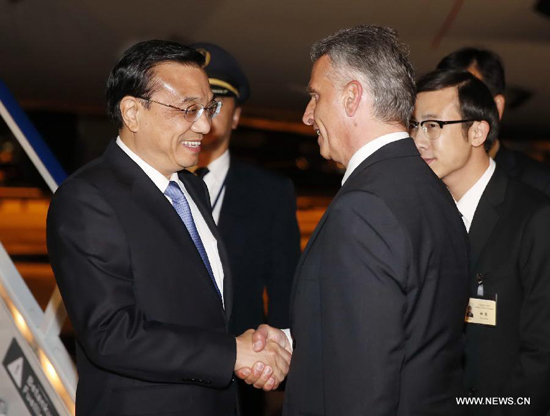FTA and trade barriers to top Li's agenda on Swiss, German visits
- By Ren Bin & Fan Junmei
 0 Comment(s)
0 Comment(s) Print
Print E-mail China.org.cn, May 24, 2013
E-mail China.org.cn, May 24, 2013
|
|
|
Chinese Premier Li Keqiang (L, front) is welcomed by Swiss Vice President and Foreign Minister Didier Burkhalter, upon his arrival in Zurich, Switzerland, May 23, 2013. [Xinhua] |
Chinese Premier Li Keqiang's visits to Switzerland and Germany are likely to be dominated by efforts to reach a free trade agreement (FTA) and lower trade barriers, according to Mei Xinyu, a researcher with the Chinese Academy of International Trade and Economic Cooperation at the Ministry of Commerce.
Germany is the last stop on Li's four-country tour, which has previously taken him to India, Pakistan and Switzerland. It is Li's first foreign tour since taking office in March.
The European Union (EU) has been an important trading partner for China. However, economic recession has dragged many EU members into heavy debt and Mei noted that the generous welfare systems in many EU countries and resultant lack of work ethic was stymieing the recovery ahead of the introduction of a number of punishing welfare reform programs.
The German economy looks set to recover faster than the other EU economies thanks to its more qualified labor force after the Merkel administration carried out painful but necessary reforms. Germany is currently China's biggest European trading partner and Li's upcoming trip will undoubtedly boost China's exports to the EU.
During the visit the two countries will ink a series of agreements in the fields of manufacturing, investment, finance, and urbanization, according to sources with the Ministry of Foreign Affairs and the Ministry of Commerce. But Mei said it was necessary to encourage more Chinese enterprises to invest in Europe in the long run.
Days before Li embarked on his European visit, Germany's vice chancellor and economy minister Philipp R?sler reportedly attacked the European Commission's plans to impose anti-dumping duties on Chinese solar panels, labeling them a "grave" mistake. In addition, major organizations from the German manufacturing industry called for immediate dialogue with China to avoid the duties on imports threatened by the EU. In light of this, Mei commented that Li's visit to Germany may be positive in terms of the prospects for lowering trade barriers, but is unlikely to solve the problems caused by European protectionism.
Mei also believes that the trade barriers set against China bear a close resemblance to the political systems of the EU countries. Only by undergoing wholesale reform can protectionism be diminished, otherwise countries would be less competitive in the market and consumers would be denied access to high quality and reasonably priced commodities.
Discussing Li's visit to Switzerland, Mei described the country, which was one of the first European countries to establish economic ties with China, as China's unique trading partner. Switzerland was one of the most important channels for China's foreign trade during the period of Western-imposed blockage and embargo and it is likely that the two countries will sign a free trade agreement during the visit, the implications of which will be significant.
New Zealand was the first, and is so far the only developed country to have signed an FTA with China. Therefore, an FTA between China and Switzerland, which is one of the world's top 20 economies, would definitely generate positive influence in Europe, noted Mei.






